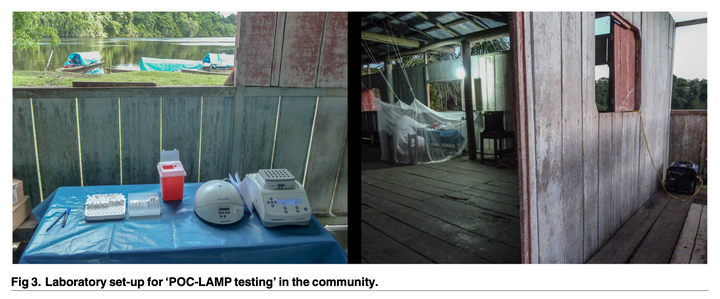Loop-mediated isothermal DNA amplification for asymptomatic malaria detection in challenging field settings: Technical performance and pilot implementation in the Peruvian Amazon

Abstract
Background
Loop-mediated isothermal DNA amplification (LAMP) methodology offers an opportunity for point-of-care (POC) molecular detection of asymptomatic malaria infections. However, there is still little evidence on the feasibility of implementing this technique for population screenings in isolated field settings.
Methods
Overall, we recruited 1167 individuals from terrestrial (‘road’) and hydric (‘riverine’) communities of the Peruvian Amazon for a cross-sectional survey to detect asymptomatic malaria infections. The technical performance of LAMP was evaluated in a subgroup of 503 samples, using real-time Polymerase Chain Reaction (qPCR) as reference standard. The operational feasibility of introducing LAMP testing in the mobile screening campaigns was assessed based on field-suitability parameters, along with a pilot POC-LAMP assay in a riverine community without laboratory infrastructure.
Results
LAMP had a sensitivity of 91.8% (87.7–94.9) and specificity of 91.9% (87.8–95.0), and the overall accuracy was significantly better among samples collected during road screenings than riverine communities (p≤0.004). LAMP-based diagnostic strategy was successfully implemented within the field-team logistics and the POC-LAMP pilot in the riverine community allowed for a reduction in the turnaround time for case management, from 12–24 hours to less than 5 hours. Specimens with haemolytic appearance were regularly observed in riverine screenings and could help explaining the hindered performance/interpretation of the LAMP reaction in these communities.
Conclusion
LAMP-based molecular malaria diagnosis can be deployed outside of reference laboratories, providing similar performance as qPCR. However, scale-up in remote field settings such as riverine communities needs to consider a number of logistical challenges (e.g. environmental conditions, labour-intensiveness in large population screenings) that can influence its optimal implementation.